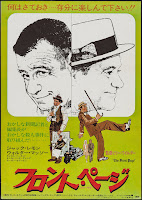Billy Wilder's remake of Charles MacArthur and Ben Hecht's 1928 play occupies a snug but odd place in the filmographies of all those in it. A snapshot of the differing states of the careers of its actors, crew, and writers, if you will. Already brought to the screen (slightly censored from the stage version) in 1931 and again in 1940 as His Girl Friday, the story struck again while the iron was hot in the wake of Watergate and a slew of films themed around the era's paranoia. That, coupled with the wave of nostalgia films also ubiquitous for the rest of the decade (Paper Moon, The Great Gatsby, The Sting), likely spurred Universal to throw their newsboy cap into the ring as well.
Adapted by Wilder's main scribe I.A.L. Diamond, TFP takes advantage of a great cast, relaxed 70s standards, and timely source material to produce an admirable if ultimately mixed result.
Indeed, a fundamental flaw that is soon noticed with TFP is its timing, pacing, and relative lack of tightness in its energy and direction. Wilder seemingly aims for lines of dialogue to simply not overlap, which is often doom for a fast-paced satire.
On the upside, Lemmon and Matthau are great together, and Diamond's screenplay rightfully expands Matthau's role and accommodates their winning chemistry. The factors of the source material's dialogue, Matthau and Lemmon's quicker timing, and far worse outings such as Buddy Buddy and The Odd Couple II have given me a new appreciation of this film on recent rewatches.
Make no mistake, TFP is not a long film (it's barely over an hour and forty minutes), but it can feel that way at times, especially in the first half. Perhaps Wilder was better off just allowing Matthau, Lemmon, and others to pick up the pace and inherent manic energy characteristic of the profession being satirized.
THE ROLE OF ADAPTATION
Diamond's script adds several new characters while removing several others, such as Hildy's future mother-in-law who Walter kidnaps (as hilarious as Matthau's Walter doing this would be).
But the best immediate result of Diamond's adaptation is the expansion of Walter Burns' screentime, unsurprising given Matthau's star power and excellent casting.
The downside comes as a result of the aforementioned looser standards in language, as while Deliberate Values Dissonance is definitely in play here, the mentions of "f*ggot" and other words not in the original play come off as jarring and even a little cheap, especially given how characters already use terms like "red" and "pinko", (but not harsher versions of those words) in the period slang context.
THE STUFF OF SLATES (AND THE REST...)
Wilder and Co. put together a stellar supporting cast for TFP. Loaded with character actors, Wilder regulars, and "before they were big"s, TFP's roster includes but is not limited to...
THE STUFF OF PLATES
Despite its flaws, I've found myself coming back to TFP time and time again for its period detail, cinematography (by Jordan Cronenweth), lighting, and atmosphere. It's not a far cry from other period films of the 70s, but its setting and somewhat-claustrophobic feel (for its 2.39:1 aspect ratio) reminds me of rainy winter nights at home rather than Chicago in the summertime (which you'd think would be hotter than seen in the film, but who knows).
OTHER OBSERVATIONS
TIDBITS AND SUCH
Like with its cinematography, another visual aspect of TFP that stuck with me was its great posters (U.S. and Japanese ones above). Given the amount that survives today in the form of posters, lobby cards, and foreign release materials, Universal seemed to have been gunning for a massive hit that ultimately fell a bit short.










































Being a huge Carol Burnett fan and having loved "The Odd Couple" when I was young, I was very eager to see "The Front Page" when it came out. But it was a Christmas season release that opened on the very same day as THE TOWERING INFERNO and AIRPORT 75...and you know how I love disaster movies. So I never got around to seeing this until it was almost gone from the theaters. Our entire family went, however, and everyone seemed to enjoy it. Me, I have never seen it since 1975 and I remember next to nothing about it. SO I thank you for your wonderful post with its great screencaps that helped jog a memory or two. It really is a great period-looking film. But like as they reference in the DOLEMITE film, I don't suppose it had many laughs! Thank you, too, for your generous links to my blog. That's very kind of you. I found your piece very enjoyable and informative in structurally breaking down where some of the film worked for you and where it didn't.
ReplyDeleteHi Ken, I'm glad I could jog your memory! (These days, that's hard for me to do with my own memory!)
ReplyDeleteThe film turned a profit, but seemed largely forgotten outside of Wilder fans and Matthau and Lemmon fans for quite some time. With the North American Blu-ray release in 2019, the critical consensus seems to be "it's not great, but it's not as bad as others say". I, while disliking "Buddy Buddy", can't really muster up a totally improved view of this film.
There really is so much that's good about it, but the whole film has an air of "something missing" during its runtime, and Wilder's efforts to make every line heard clearly (a decision Lemmon later regretted) drag down a story that's so critically dependent on timing.
Thank you so much for your kind comments. This film's exterior shots (and final train station scene) were filmed in San Francisco, so you might be able to recognize them. ��